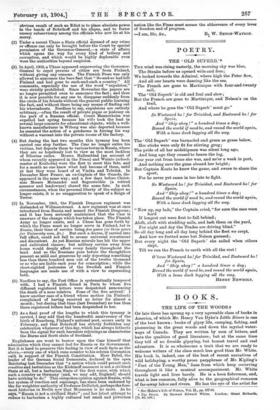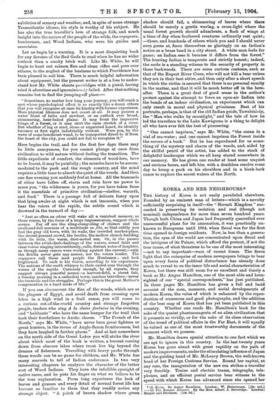OF late there has sprung up a very agreeable class
of books in America, of which Mr. Henry Van Dyke's Little Rivers is one of the best known : books of gipsy life, camping, fishing, and pioneering in the great woods and down the myriad water- ways of Canada. They are written by men of letters, and have the qualities of good literature; but at the same time they tell of no fireside gipsying, but honest travel and real adventure. It is so wholesome a trait that we are ready to welcome writers of the class much less good than Mr. White. His book is, indeed, one of the best of recent narratives of wild holidaying, a worthy prose paraphrase of Mr. Kipling's "Feet of the Young Men," lines from which keep occurring throughout it like a musical accompaniment. Mr. White travels light and lives barely. He is a keen fisherman, and, what is lees common, fully alive to the geographical romance of far-away,la.kes and rivers. He has the eye of the artist for ° Bee Nalisn's Life of -Nelson, VoL IL, Pp. =M.
t The Forest. By Stewart Edward White. London: Grant Richard& f7s. 6d. net.1
subtleties of scenery and weather, and, in spite of some strange Transatlantic idioms, his style is worthy of his subject. He
has also the true traveller's love of strange folk, and much insight into the nature of the people of the wilds, the voyageurs,
lumbermen, and Wood Indians, who were his guides and associates.
Let us begin by a warning. It is a most disquieting book for any devotee of the Red Gods to read when he has no wider outlook than a smoky brick wall. Like Mr. White, he will begin to hunt out salmon flies and clean rifles and pore over atlases, to the neglect of the business to which Providence has been pleased to call him. There is much helpful information about equipment, but the present writer is at a loss to under- stand how Mr. White shoots partridges with a pistol, having tried it aforetime and ignominiously failed. After that nothing remains but to find the jumping-off place :—
" Sometimes, no matter how long your journey, you will reach a spot whose psychological effect is so exactly like a dozen others that you will recognise at once its kinship with former experience. Mere physical likeness does not count at all. It may possess a water front of laths and sawdust, or an outlook over broad, shimmering, heat-baked plains. It may front the impassive fringe of a forest, or it may skirt the calm stretch of a river. But whether of log or mud, stone or unpainted board, its identity becomes at first sight indubitably evident. Were you, by the wave of some beneficent wand, to be transported direct to it from the heart of the city, you could not fail to recognise it."
Here begins the trail, and for the first few days there may be little annoyances, for you cannot plunge at once from
civilisation to wild nature without feeling the transition. The little expedients of comfort, the elements of wood-lore, have to be learnt, it may be painfully ; the muscles have to be accom- modated to the pack and the rough country, and the mind requires a little time to absorb the quiet of the woods. And then one fine evening you suddenly feel at home. All the trammels of cities have fallen off, storm and rain have no power to move you, "the wilderness is yours, for you have taken from it the essentials of primitive civilisation—shelter, warmth, and food." There is a passage full of delicate fancy upon that lying awake at night which is not insomnia, when you bear the voices of the rapids, the subtle sound which is drowned in the turmoil of day :—
" Just as often an odour will wake all a vanished memory, so these voices, by the force of a large impressionism, suggest whole scenes. Far off are the cling-clang-cling of chimes and the swell-and-fall murmur of a multitude en fete, so that subtly you feel the gray old town, with its walls, the crowded market-place, the decent peasant crowd, the booths, the mellow church building with its bells, the warm, dust-moted sun. Or, in the pauses between the swish-dash-dashings of the waters, sound faint and clear voices singing intermittently, calls, distant notes of laughter, as though many canoes were working against the current,—only the flotilla never gets any nearer, nor the voices louder. The voyageurs call these mist people the Huntsmen ; and look frightened. To each is his vision, according to his experience. The nations of the earth whisper to their exiled sons through the voices of the rapids. Curiously enough, by all reports, they suggest always peaceful scenes—a harvest-field, a street fair, a Sunday morning in a cathedral town, careless travellers—never the turmoils and the struggles. Perhaps this is the great Mother's compensation in a hard mode of life."
If you can circumvent the flies of the woods, which are as
the plagues of Egypt, and avoid death from crossing open lakes in a high wind in a frail canoe, you will come to
a curious out-of-the-world country and strange forgotten people, traders who sing A la claire fontaine in the evening, and " habitants " who have the same hunger for the trail that took their forefathers to Arctic shores. "The French of the
North," says Mr. White, "have never been great fighters or great hunters, in the terms of Anglo-Saxon frontiersmen, but they have laughed in farther places." And at last somewhere on the north aide of the Great Lakes you will strike the river about which most of the book is written, a torrent coming down from obscure lakes where trout live big beyond the dreams of fishermen. Travelling with heavy packs through these woods can be no game for children, and Mr. White has many marvels to tell of Indian endurance. In two very interesting chapters he analyses the character of the better sort of Wood Indians. They have the infallible eyesight of native races, and he puts his finger on what we believe to be the true explanation. From long experience the look of leaves and grasses and every detail of normal forest life has become so familiar to them that they readily notice any strange object. "A patch of brown shadow where green
shadow should fall, a shimmering of leaves where there should be merely a gentle waving, a cross-light where the usual forest growth should adumbrate, a flash of wings at a time of day when feathered creatures ordinarily rest quiet; —these, and hundreds of others which you and I should never even guess at, force themselves as glaringly on an Indian's notice as a brass band in a city street. A white man looks for game; an Indian sees it because it differs from the forest." The hunting Indian is temperate and strictly honest; indeed, the cache is a standing witness to the security of property in these backwoods. There are some curious customs, such as that of the Rupert River Crees, who will not kill a bear unless they are in their best attire, and then only after a short speech in which the victim is assured that there is no personal enmity in the matter, and that it will be much better off in the here- after. There is a great deal of good sense in the author's protest against the attempt to force an open-air Indian into the bonds of an indoor civilisation, an experiment which can only result in moral and physical griminess. Best of his portraits, perhaps, is that of the old Indian guide, Tawabinisiy, the "Man who walks by moonlight," and the tale of how he led the travellers to the Lake Kawagama is a thing to delight all who have ever felt the lust of pioneering.
"One cannot imprison," says Mr. White, "the ocean in a vial of sea-water; and one cannot imprison the Forest inside the covers of a book." But he has reproduced for us some- thing of the mystery and charm of the woods, and, aided by the skilful pencil of the artist, has added to the stook of delightful landscapes which we all keep stored somewhere in our memory. He has given one reader at least some unquiet and envious hours, and left him with a deathless resolve some day to hump a pack on his shoulders and in a birch-bark canoe to explore the secret waters of the North.







































 Previous page
Previous page